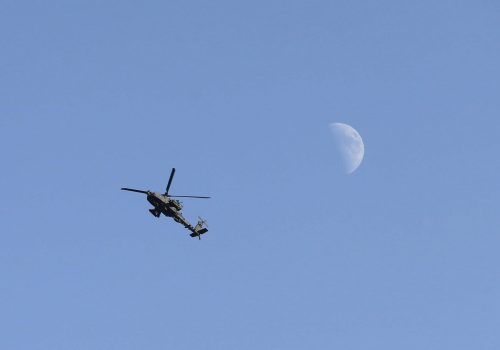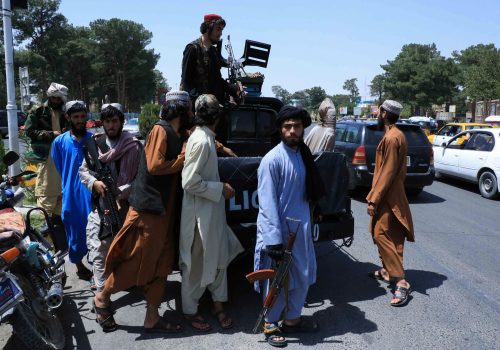Vietnam’s lessons for the Afghanistan failure: Don’t count out US leadership just yet
The August 15 images of helicopters lifting fleeing diplomats from the US embassy in Kabul—like those of a similar calamity in Saigon in April 1975—will weigh on the United States. US President Joe Biden had dismissed the possibility of such a scenario just weeks ago, which suggests that neither he nor his administration understood the situation on the ground. Although the decision to pull out of Afghanistan was defensible (though questionable), the United States executed that decision poorly, making the worst outcomes more likely. We’re now faced with a humanitarian disaster for those Afghans who trusted the United States, embraced our values, or even worked with us and our allies over the past twenty years.
What will the debacle in Afghanistan mean for US strategy in the world and for its friends and allies who are watching all of this with dismay? For that question, the answer may lie in the consequences of US failure in Vietnam.
In Vietnam, as in Afghanistan, the United States understood neither the nature of its enemy nor the weaknesses of its friends. In both cases, the United States covered up stalemate with over-optimistic assessments and then, out of frustration and in response to public weariness, cut and ran. Then US President Richard M. Nixon and National Security Advisor Henry Kissinger did a better job than the Trump and Biden administrations by disguising their retreat for a time, but the result was the same as in Afghanistan: catastrophic defeat for those the United States backed, a disaster for those who trusted in the United States, and a blow to US strategy.
The US failure in Vietnam occurred amid an American crisis of confidence and contributed to it. Then as now, the United States was polarized socially and politically, shaken by racial strife, urban riots, rising violent crime, and profound political tensions, the latter caused by a president who had tested the US constitutional order.
In these circumstances, Americans generalized the Vietnam debacle. To many, defeat seemed like proof that the US Cold War strategy and even US leadership in the world had failed. What had worked so well for the United States in post-World War II Europe, Japan, and South Korea—building alliances, providing military security against communist adversaries, and helping countries emerging from the ruin of war integrate into a US-led liberal international system—did not work in Southeast Asia. Even more, by the mid-1970s many Americans believed that the United States, by virtue of its failings at home and in Vietnam, had no business attempting international leadership at all.
Many Americans concluded that the United States had to pull back in the world and concentrate on challenges at home; that America’s grand strategy, articulated in the 1941 Atlantic Charter between then US President Franklin Roosevelt and UK Prime Minister Winston Churchill, of seeking to advance a rules-based, liberal world order was a waste of blood and treasure. After the fall of Saigon, this view was espoused by many on the left and those of the realist school of thought who drew lessons, often wise, about overreach and overconfidence. A sense of inevitable US decline infused many of those arguments.
As a demoralized United States retreated from Vietnam in chaos, the Soviet Union believed that its time had come. It increased aggression abroad, culminating, ironically, with its 1979 invasion of Afghanistan. Many Americans and much of the foreign-policy establishment, demoralized by defeat in Vietnam, concluded that the Soviet Union was winning the Cold War, a view that lasted well into the 1980s.
And yet.
Less than fifteen years after the fall of Saigon, the Berlin Wall fell, and the Soviet Union fell apart shortly thereafter. Former US President Ronald Reagan helped turn around the national mood and pushed back against the Soviets. But the critical actors in the final chapter of the Cold War were determined democracy activists in Central and Eastern Europe who linked up with mass social movements, especially in Poland and the Baltic countries. They were inspired by the vision of a democratic and freedom-supporting United States, undeterred by American pessimism, and committed to achieving freedom for their nations: patriotism in democratic form. They enjoyed some help from the United States but mainly achieved success by themselves as communism decayed. Those activists believed in the United States more than many Americans believed in themselves. And they won.
As it turns out, US strategy during the Cold War—supporting freedom and resisting Soviet communism—succeeded, even in the face of Washington’s blunders in Vietnam and elsewhere. We must have been on to something about the attractive power of freedom and about the resilience of the US-led liberal international system—and the United States itself.
The lessons of defeat in Vietnam, understood properly, may help inform Americans as they grapple with the lessons of defeat in Afghanistan.
One big lesson is that no strategy, even a good one, can protect against stupid. American grand strategy for generations has sought to advance democracy, free markets, and the rule of law because it ultimately serves US interests. That strategy may be the right one. But being right in general doesn’t mean that strategy will work in every country and at any given time. Lessons from the Vietnam debacle about attention to local conditions, realities on the ground, and the limits of American patience and resources have been proven valid with respect to Afghanistan. Americans’ expectations about what the United States can achieve in any particular country need to be tempered. And the bar for military action in far-flung, less organized countries, particularly long-term ground operations, will go up, as it should.
However, even this reasonable lesson could prove complicated in practice. The United States helped topple the Taliban after the 9/11 terrorist attacks, and for good reason. Several relatively calm years followed, a golden period that perhaps lent itself to creating better outcomes for Afghanistan, but the United States turned toward Iraq. Could greater concentration on Afghanistan have achieved a better result? Although the best outcome in Afghanistan—a peaceful, modernizing society and burgeoning democracy—might not have been achievable, much was achieved in the past twenty years. Reflecting today, could the United States have preserved that progress through an extended commitment of its relatively modest force presence? Would such a muddling, frustrating solution have been better than what the United States may now face in and from Afghanistan? I suspect the answers are yes, though Biden in his August 16 remarks to the nation argued otherwise and made a strong case. Fights over those questions could be bitter and inconclusive.
A firmer lesson is that while the United States should not attempt too much under unfavorable conditions, it must guard against doing little to support its friends and values. China and Russia are crowing about US failure in Afghanistan and may try to test the United States with new aggression. I’ve heard from anxious friends from Poland, Baltic nations, Ukraine, and others among Europe’s more exposed countries worried about the steadiness of the United States, in which they have put so much trust and thanks to which they have achieved a great deal.
Biden has argued to the nation that the now-defunct Afghan government was unwilling to fight for its country. The Biden administration needs to follow defeat in Afghanistan with steadiness toward worried friends who are willing and able to defend themselves. Ukraine, for all its shortcomings, is one such democracy. Biden can make clear when Ukrainian President Volodymyr Zelenskyy visits Washington in late August that there is no green light for Putin to attack in direct or hybrid form. The administration should make early efforts—through NATO and bilaterally—to convey to worried allies that it is reliable and that the United States will not turn inward—and that the administration means it. Washington should develop options to counter Putin’s possible avenues of cyber, energy, or hybrid aggression. The administration should also meaningfully convey that same message to allies in Asia such as South Korea, Taiwan, and Southeast Asian countries (ironically including Vietnam) that see the United States as balancing power with respect to China and are also willing to defend themselves.
The Biden administration needs to move hard and fast to protect those Afghans who trusted the United States and its values, to contain Afghanistan under the Taliban, to give no opportunity to authoritarians seeking to take advantage of this bad moment, and to show worried allies that the United States they thought was “back” truly has returned. American foreign policy will have to find that elusive balance of operational realism sorely lacking in Afghanistan as in Vietnam, without throwing out the best principles of its grand strategy—to advance values and interests together with allies—that achieved so much over the past three generations.
Daniel Fried is the Weiser Family distinguished fellow at the Atlantic Council. He was the coordinator for sanctions policy during the Obama administration, assistant secretary of State for Europe and Eurasia during the Bush administration, and senior director at the National Security Council for the Clinton and Bush administrations. He also served as ambassador to Poland during the Clinton administration. Follow him on Twitter @AmbDanFried.
Further reading
Image: CH-46 Sea Knight military transport helicopter flies over Kabul, Afghanistan on August 15, 2021. Photo via a Reuters stringer.


